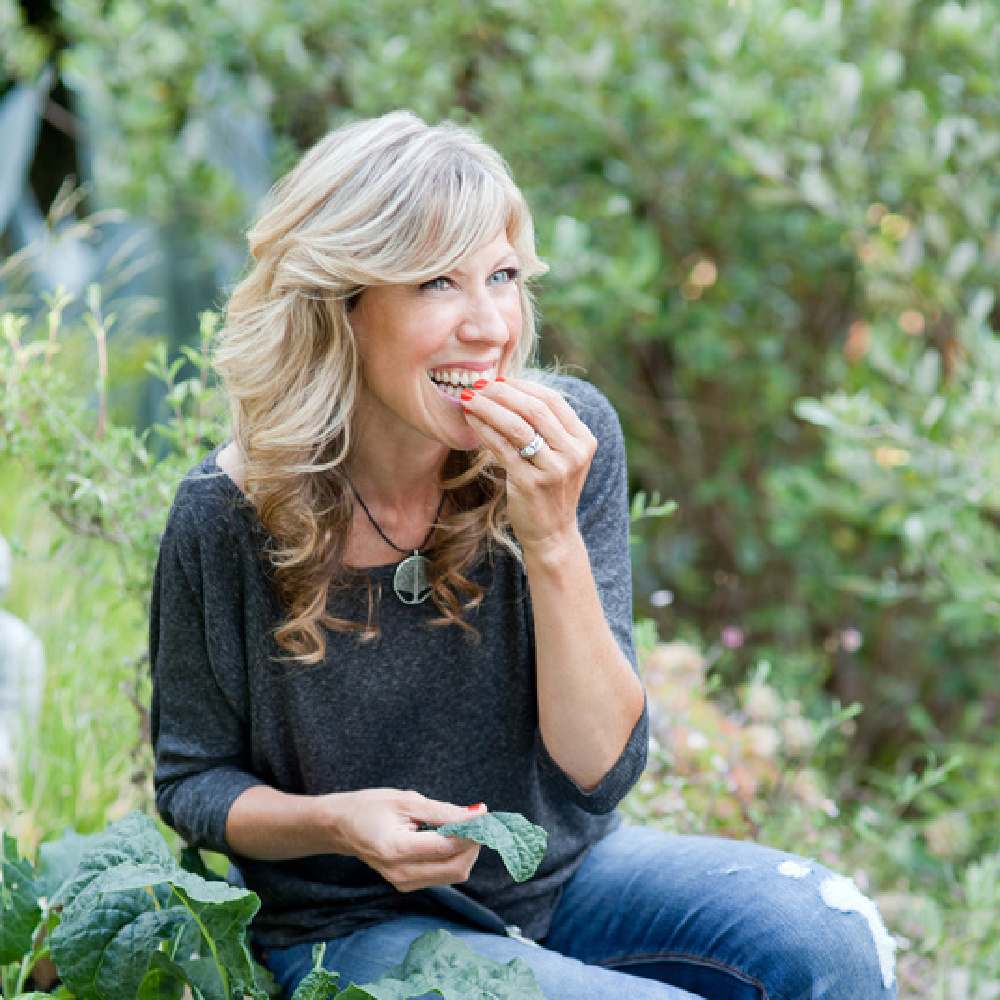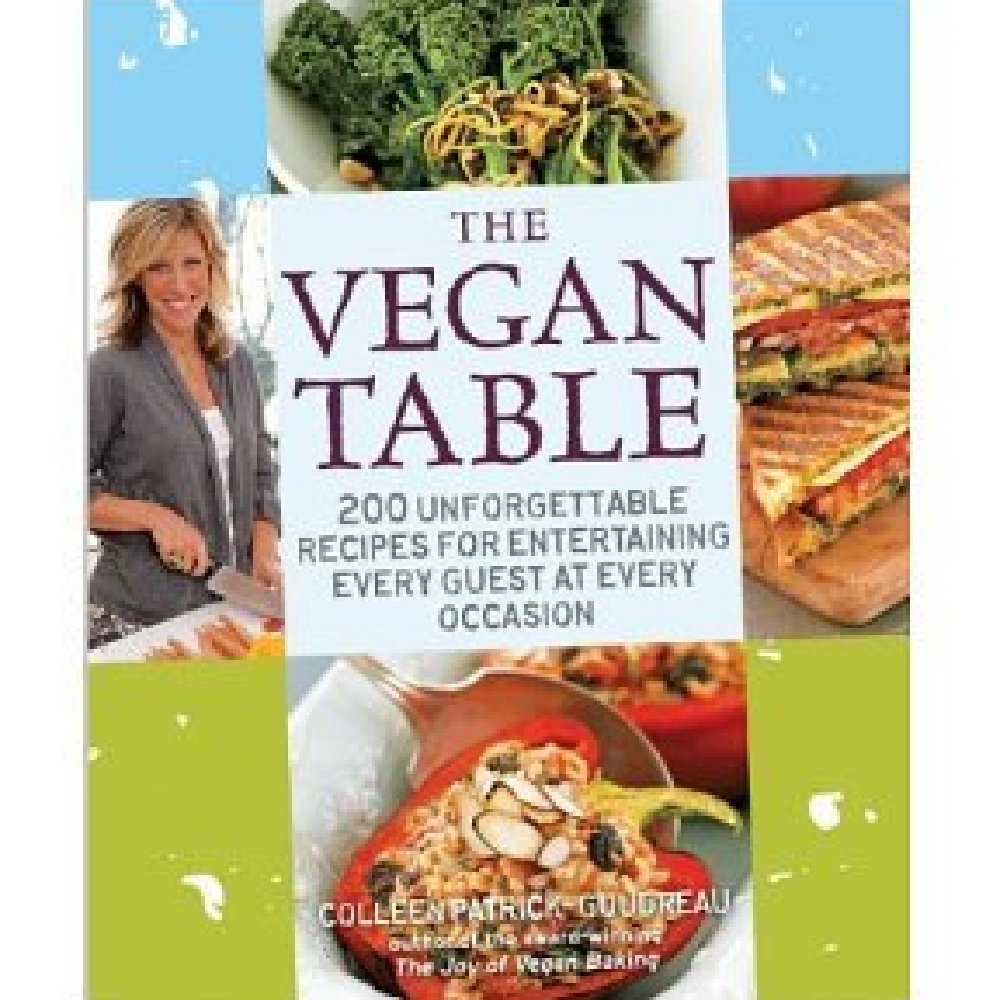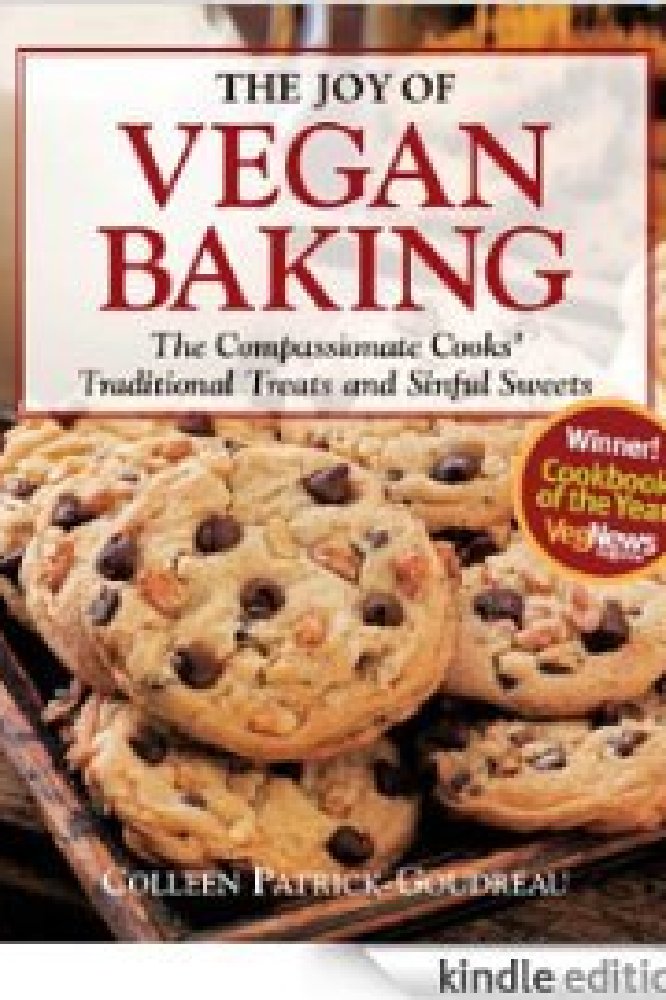In Colour Me Vegan you talk about the importance of having a rainbow on your plate- so why are natural foods that are rich in colour better for us than foods that aren't?

Colleen Patrick-Goudreau
Well, first of all, when you base your diet on color, you're choosing the most healthful foods on the planet: plants (fruits, vegetables, nuts, seeds, mushrooms, beans, grains, herbs, and spices), and these foods are so healthful because of what they HAVE and DON'T HAVE.
Being plants, they don't have any dietary cholesterol, substantially less saturated fat, lactose, and of course animal protein, which people are getting waaay too much of! But what's also important is what they DO contain: vitamins, minerals, fiber, folate, antioxidants, and phytochemicals.
These phytochemicals I mentioned are very exciting - and we're really just in the beginning stages of this type of research - but they are basically powerful nutrients that protect the plant from the damage caused by insects and UV radiation, etc., and it turns out they protect us, too - in terms of preventing cancer cell replication, decreasing cholesterol levels, strengthening the immune system, slowing the aging process, etc.
It's estimated that there are hundreds of phytochemicals in each of the plant foods we eat, but we can detect the highest CONCENTRATION, the highest SATURATION of these phytochemicals because of the color for instance:
Orange beta carotene in carrots and yams
Blue anthocyanins in blueberries
Red betacyanins in beets
Yellow lutein in corn
Eating a VARIETY of colorful plant foods should be the goal. Eat by color.

The Vegan Table is all about entertaining for your friends and family, so do you remember your first vegan dinner party and what can you tell us about it?
I think it was Thanksgiving the year I became vegan. We had some vegetarian friends over and served a Tofurky with all the side dishes we all love at Thanksgiving. :) I've become much more creative since then, but it was a start. :)

The Joy of Vegan Baking is all about cooking indulgently, so why are vegan sweet treats so much healthier than non-vegan indulgences?
Misconceptions about vegan cooking abound, but there seems to be actual incredulousness at the idea of baking without eggs and dairy - on the part of vegans and non-vegans alike. Part of this is due to the myth that vegan baked goods are somehow incomplete or inferior to those made with eggs and dairy. Part of this is due to the fact that people have an emotional attachment to certain foods or recipes. And part of this is based on no real foundation; that is to say, many people who denounce vegan baking have never tried vegan desserts/baked goods, or if they had, they would most likely not know the difference anyway.
The Joy of [Vegan] Baking debunks the myth that dairy- and egg-free baking is inferior to "traditional baking" and demonstrates that it is actually superior to what most of us were taught. Featuring the familiar standards with which people grew up, these recipes are not merely "vegan versions" but rather "improved versions" of the old favorites. In other words, people can have their cake and eat it, too. They can enjoy familiar, traditional, homespun baked goods and desserts that happen to be free of such disease-causing substances as saturated fat, dietary cholesterol, animal protein, foodborne pathogens, and lactose. I don't pretend to pass off baked goods as "health food," but when compared to baked goods that use animal products, they are much healthier for the reasons named above. They're also far superior when you consider the fact that they don't contribute to the exploitation of animals or to the devastating environmental effects of animal agriculture.

You must hear from people all the time who have significantly changed their lives with The 30 Day Vegan Challenge, so who's story has stood out for you the most?
I'm moved every day by the emails I receive from people of all ages all around the world. Non-vegans who just picked up the book to eat healthier but wound up having a complete paradigm shift and becoming fully vegan and finding their compassion for animals. People who were vegetarian but didn't realize the violence and exploitation in the dairy and egg industries and who became vegan from the book. People who were already vegan but didn't know how to talk about their ethics in a way that was truthful but also effective. I put out a "Made-My-Day Email" on Facebook every day, and I do a "Love Fest" podcast episode every year in which I read all of the letters that came in from that past year of people whose lives have been transformed from this work. It's incredibly moving and gratifying, and it's what gives me hope.

If you could recommend something to watch to enlighten people about the practices that go on in factory farms what would you pick?
I think the documentary film Cowspiracy is fantastic.
Can you tell us about a typical day in your world?
I wake up early, and the first priority is to feed my cats, Charlie and Michiko. I then meditate, make a pot of green tea, let Charlie sit on my lap (because it's his favorite thing to do), while I read the morning news and put out my morning Instagram photo. Then, it varies: I either run or shower and get to work. It might be either writing the newest podcast episode, writing articles, or answering interview questions. I spend most of my day writing and managing my various projects. In the afternoon, I run if I hadn't already or I have lunch meetings. In the afternoon, I return to writing. It's pretty routine. :) Then, in the evening, my husband and I eat together and either watch a movie or read.
You have been vegan for many years now, please tell us about the moment when you stopped eating animal products and why.
About 25 years ago, I became vegetarian after reading John Robbins’ book Diet for a New America, which explores the effect modern factory farming has on the animals, the earth, and human health. I became vegetarian for the animals. Period. But I still ate cow's milk, chicken's eggs, etc. and bought only organic thinking I wasn't contributing to cruelty. (And of course it's not like I ate organic when I went to restaurants!)
It wasn't until I read a book called Slaughterhouse 17 years ago by Gail Eisnitz, which is an investigation into slaughterhouses around the country that I was devastated all over again and realized that for all animals bred for food, the end is the same.
We breed animals just to kill them - and the slaughter itself is horrific. Dairy cows, are sent to slaughter when they are 4 or 5 years old, their bodies worn out after a lifetime of giving 10 times more milk than she would if she could feed her baby naturally. Cows could live 20 or 25 years. Most of the hamburger in this country is from ground up dairy cows. Egg-laying hens, who are crammed in cages with several other hens with not even enough room to raise a wing, are killed after one year and are often used for chicken soup, chicken pot pies, and other processed foods where people wouldn't be able to detect the bruises on their bodies. Cows were meant to give milk to their babies, just like any lactating female, and they are kept pregnant every year to keep the milk flowing. And so, I woke up...I woke up to my compassion and to the suffering of the animals I was contributing to. Choosing not to be part of the inherent violence in the slaughter industry was the best thing I ever did.
What recipe from all of your books do you make most regularly?
The Carrot and Ginger Soup from The Vegan Table and Coconut Bacon from The 30-Day Vegan Challenge.
Please tell us about your exercise regime to stay in shape and how you fuel it with vegan food.
I do some kind of cardiovascular exercise for at least one hour a day. If I don't run, I'm either hiking or walking. Aside from that I do some weight resistance. I wouldn't consider myself an athlete at all -- just someone who loves moving, so I don't really obsess over what foods I eat before or after a workout -- just my typical healthful whole foods.
What is next for you?
I'm focused on growing The 30-Day Vegan Challenge brand by offering versions to schools, businesses, hospitals, and non-profit organizations. I've sold or given away all the copies we printed for this last run, and I'm hoping a Kickstarter campaign will help me print more. I also just launched my daily email campaign The Daily Dose of Compassion (dailydoseofcompassion.com), and I'm working on some TV shows. All good stuff...all meant to shift the paradigm for animals.
Tagged in Vegan Colleen Patrick-Goudreau

